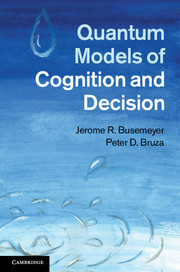Book contents
- Frontmatter
- Contents
- Preface
- Acknowledgments
- 1 Why use quantum theory for cognition and decision? Some compelling reasons
- 2 What is quantum theory? An elementary introduction
- 3 What can quantum theory predict? Predicting question order effects on attitudes
- 4 How to apply quantum theory? Accounting for human probability judgment errors
- 5 Quantum-inspired models of concept combinations
- 6 An application of quantum theory to conjoint memory recognition
- 7 Quantum-like models of human semantic space
- 8 What about quantum dynamics? More advanced principles
- 9 What is the quantum advantage? Applications to decision making
- 10 How to model human information processing using quantum information theory
- 11 Can quantum systems learn? Quantum updating
- 12 What are the future prospects for quantum cognition and decision?
- Appendices
- References
- Index
12 - What are the future prospects for quantum cognition and decision?
Published online by Cambridge University Press: 05 August 2012
- Frontmatter
- Contents
- Preface
- Acknowledgments
- 1 Why use quantum theory for cognition and decision? Some compelling reasons
- 2 What is quantum theory? An elementary introduction
- 3 What can quantum theory predict? Predicting question order effects on attitudes
- 4 How to apply quantum theory? Accounting for human probability judgment errors
- 5 Quantum-inspired models of concept combinations
- 6 An application of quantum theory to conjoint memory recognition
- 7 Quantum-like models of human semantic space
- 8 What about quantum dynamics? More advanced principles
- 9 What is the quantum advantage? Applications to decision making
- 10 How to model human information processing using quantum information theory
- 11 Can quantum systems learn? Quantum updating
- 12 What are the future prospects for quantum cognition and decision?
- Appendices
- References
- Index
Summary
Quantum theory has inspired many new ideas for understanding Cognition and decision making. Given the nascent state of this field, many new challenges still remain. What are the strengths and unique contributions of these ideas? What are likely next steps in its development? How can it be applied to practical problems in cognitive science? Is this a rational or an irrational system of reasoning? What, if any, are its connections to neuroscience? Should the hard problem of consciousness be considered? These are questions that we try to address in this chapter, albeit at times in a limited way. We end with a debate with a fictitious skeptic (actually previous reviewers) of these ideas. Let us start by reviewing what we have covered so far.
Contributions to cognition and decision
We begin by summarizing the conclusions reached in previous chapters regarding the usefulness of quantum theory for modelling phenomena in cognition and decision. Chapter 1 provided some motivation and Chapter 2 provided a theoretical introduction to quantum theory. Chapter 3 presented a quantum model to account for question order effects on survey research. An exact and parameter-free test was derived from the model, which produced surprisingly accurate predictions for results obtained from three different large Gallup poll survey studies. Chapter 4 described a quantum model of probability judgments to account for findings that produce violations of classic probability theory, including conjunction and disjunction fallacies and order effects on inference.
Information
- Type
- Chapter
- Information
- Quantum Models of Cognition and Decision , pp. 338 - 360Publisher: Cambridge University PressPrint publication year: 2012
